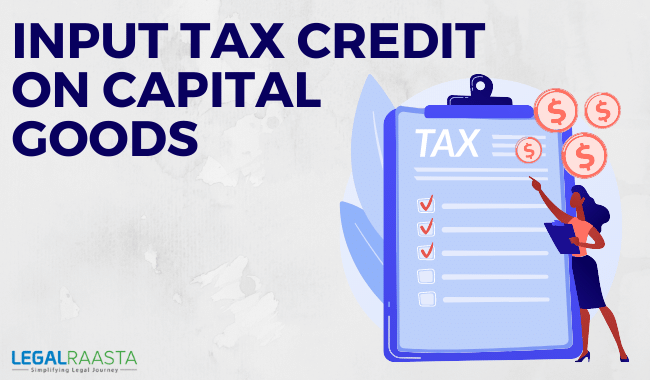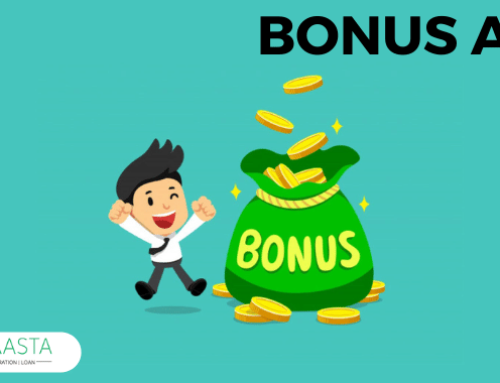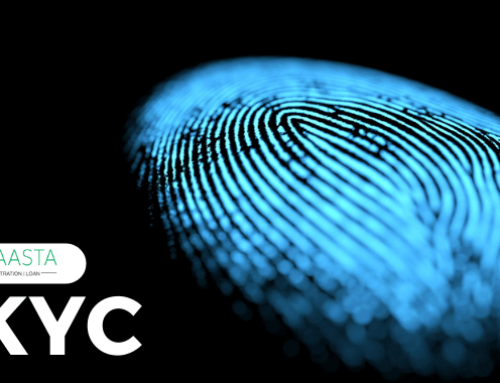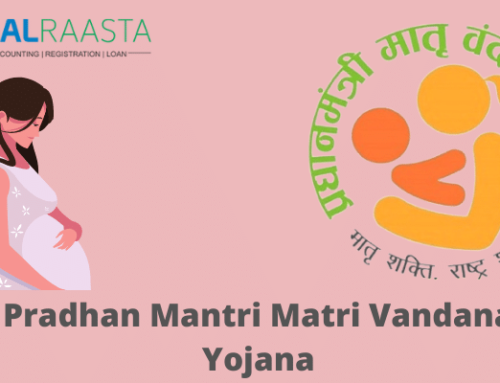The goods and service tax (GST) introduced a new concept of Input Tax Credit capital goods which is similar to that of VAT but with an important difference that the former will allow a set-off only on output rather than on both import and exports as in case of VAT. This would bring an inconsistency between two different taxation systems i.e. GST and VAT regarding the treatment of Input Tax Credit for capital goods/services respectively used or consumed domestically or exported out of India. As per GST Act, input tax credit (ITC) is allowed only on the goods and/or services as set out in List A of the 5th Schedule. Entry no. 55 of List A provides an Input tax credit on Capital Goods
Input credit means if a person has already paid GST on purchase or import of capital goods then he will get an input tax credit on such capital goods and therefore he will not need to pay any GST when selling or transferring the capital goods.
What is a Capital good for the purpose of ITC under GST?
Contents
- What is a Capital good for the purpose of ITC under GST?
- What is the meaning of ‘Transfer’ in the case of capital goods?
- Whether the transfer of capital goods is subject to a reverse charge?
- Whether ITC will be allowed on the transfer of capital goods?
- Whether there is any restriction on the use of capital goods before transfer?
- What happens in case the value of capital goods has increased after their purchase? Can any tax credit be claimed?
- ITC availed on capital goods during the time of purchase can be carried forward for utilization in future?
- Input Tax Credit on Capital Goods
- There are certain conditions that need to be fulfilled by the supplier for availing ITC:
- Conclusion
A machine used in production activity such as flour milling machine, textile machine, paper making machinery will be treated as capital goods. The present tax regime treats Capital goods (capital assets) differently from consumption goods (ordinary goods). While the sale of consumer goods is taxable, capital assets are not taxable.
However, input tax credit on capital assets used for production is allowed. The difference between capital goods and consumption goods can be understood by the nature of their disposal. When a capital good is sold, it does not result in any further supply. On the other hand, when a consumer durable is sold its supply does not stop; only its ownership changes. Since there is no further supply after-sale of capital goods
What is the meaning of ‘Transfer’ in the case of capital goods?
There are three modes of transfer allowed under GST:
- Sale
- Lease
- By way of gift
In all these cases, it will be considered as a supply, and GST on such supply has to be paid.
Whether the transfer of capital goods is subject to a reverse charge?
No. The transfer of capital goods is not subject to reverse charge under GST [section 10(7)].
The rate of GST on the transfer of capital goods is 18%.
Whether ITC will be allowed on the transfer of capital goods?
Yes. ITC on purchase of capital goods can be availed if they are transferred in the same condition as they were previously purchased.
Whether there is any restriction on the use of capital goods before transfer?
No. There is no such restriction on the use of capital goods before the transfer under GST law. Hence, it is at the discretion of the transferee to either use or sells that good, whichever gives him maximum benefit/utility.
What happens in case the value of capital goods has increased after their purchase? Can any tax credit be claimed?
If there is an increase in the value of capital goods then the GST has to be paid on such value. However, there is no provision under GST law to claim a tax credit for the increase in the value of capital goods. Hence, GST has to be paid by the current owner of the capital goods.
ITC availed on capital goods during the time of purchase can be carried forward for utilization in future?
Yes. The ITC availed on purchase or import of Capital Goods can be utilized for payment of GST liability at any stage during lifetime except certain situations as mentioned below:
a) ITC cannot be utilized if the person had not registered under GST prior to supply [Section 17(8)(b)]
b) ITC cannot be utilized if Registration was canceled under section 23(3) [Section 17(8)(c)]
c) ITC cannot be utilized if the business was closed prior to the transfer of capital goods. [Section 17 (8)(d)].
d) If capital good is used only for the purpose of leasing, then it cannot be carried forward beyond six months from the end of the month in which capital goods were transferred. [ Section 32(4)].
e)Capital goods purchased /imported by an individual or HUF or partnership firm who are not registered under GST can be utilized only for payment of IGST liability at any time during lifetime. This entitlement is subject to certain conditions i.e., they need to become GST registered within two years from the date of supply and also need to maintain books of the account [Section 39(4)].
f) The ITC cannot be utilized for payment of liability in the following situations:
1. Penalties payable under GST law [ Section 17(9)]
2. Refund payable on the return submitted under section 49 or section 50 or section 51
3. By an Input Service Distributor on any supply of services [Sections 17(10)(a)]
4. By a person who is required to make monthly returns but fails to do so.[ Section 17 (10)(b)]
Input Tax Credit on Capital Goods
- An input tax credit of input services is available on capital goods if they are used for the purpose of business or profession. For example, if a computer is used in your office for 5 years and during this period you have paid an amount (considered as input service) to some other entity, then that amount is eligible for the input tax credit. The computer being a capital asset, can not be purchased with the claim of input tax credit (purchase of capital assets without payment of sales tax is not possible).
- Capital goods are not considered as supply and they do not attract any tax at the time of disposal; only sale value is considered for taxation. For example, if a computer is sold in the market after 5 years of use, its sale value is taxable and an input tax credit of an earlier period received on its purchase cannot be claimed.
- Capital goods are not used directly in the production process; they are only made functional by adding an input service to them through installation. For example, if a computer is not made functional by installing English software on it and the computer is sold, then only sale value is taxable and an input tax credit of earlier period received can be claimed.
- Capital goods are also not used directly for further supply; they require another input service before they can be put to use as supply. For example, if a computer is not connected to the power supply and is sold, then only sale value is taxable and an input tax credit of an earlier period received on its purchase cannot be claimed.
- Capital goods are not considered as goods or services under the Law; hence they are also not included in transactions for consideration of ITC. They can not be purchased with ITC; ITC can only be received when capital goods are sold.
- Conditions for claiming input tax credit on capital goods:
- Capital Goods must be used in business or profession
- If capital goods are sold, then only sale value is taxable and an input tax credit of an earlier period cannot be claimed.
- Capital goods are assets of the business, not assets of an employee. This is to make sure that they are only used in the business and do not form part of perquisites for employees.
- Earlier period means earlier financial year in which input tax credit was received on its purchase. For example, if a computer bought in 2008-09 is sold in 2012-13, then the earlier period means 2008-09, and input tax credit received on the computer while purchasing it can be claimed.
- No ITC of the earlier period received can be claimed while importing capital goods; only ITC will be allowed when such imported equipment is resold in India after becoming functional with the help of services.
- All capital goods will be considered as one lot, whether used in the same business or different businesses at different places.
- Credit received under Central Sales Tax can also be claimed under GST on capital goods if they are used for making further supplies.
- Capital goods are not included in transition stock approved by GST Council. They cannot be sold or purchased with an input tax credit of the earlier period received.
- Capital goods are not considered as output services under the law; hence no ITC can be claimed against them when utilized for further supply.
- Capital goods are also not included in transactions for consideration, whether sale value or purchase value. Hence no GST is payable on capital goods.
- To claim the input tax credit on capital goods, all business taxpayers are required to maintain a separate inventory register that specifies year-wise details of capital goods received or sold along with their serial number or other identity proof. The maximum limit for mixing different kinds of capital goods will not be allowed under the law.
- While claiming ITC on capital goods, the full value of cost will be considered for the calculation of GST payable in the month when the sale is made.
- Earlier input tax credit received on capital goods will be considered while calculating the ITC that can be claimed later.
- All dealers who are registered under GST must file regular returns to claim ITC on capital goods sold in the market after 5 years of use. Otherwise, no penalty will be levied for not filing regular returns but they will not be allowed to claim ITC on capital goods sold.
- No penalty will be levied for not filing returns under GST, but dealers who fail to file a regular return will not be allowed to claim credit received earlier in the form of an input tax credit. This is a special exemption provided in GST law where failure to file a return can result in a levy of penalty under the earlier law.
- On failure to claim the credit on capital goods sold, dealers will have to pay GST under reverse charge mechanism as if the seller is not a registered dealer and the buyer is the registered dealer. This provision is present in all indirect tax laws including VAT where unregistered dealers can make sales and later take ITC of such purchases from other registered dealers as credit.
- All capital goods that are not taken as inventory or stock-in-trade during the transition period will be considered as cleared stock and maintenance of such capital goods outside the business premises by an unregistered dealer is punishable with imprisonment up to one year or a fine up to Rs 1 lakh or both. Only one-time clearance of capital goods in the transitional period is allowed.
- The earlier exemption on capital goods under entry no 42 of Schedule II that exempts the supply of certain immovable property has been repealed under GST law which means all immovable properties whether land, building, or complex will be taxable unless they are covered by other exemptions provided in GST law. Earlier, entry no 42 of Schedule II provides an exemption for certain immovable property.
- The earlier provision in service tax law where air travel services given free of cost by the airline are covered under reverse charge mechanism have been omitted in GST law, hence any taxable person providing taxable service can claim ITC or GST credit on such supplies. The earlier rule that exempts supply of scheduled air transport service or scheduled passenger air transport service provided by an Indian scheduled operator in a domestic sector or an international passenger air transport service provided by a non-scheduled air transport operator in a domestic route has been omitted.
- Earlier, there were exemptions on certain services like works contracts under the construction contracts, and the exemption was limited to Rs 5 lakh per invoice. This provision has been omitted in GST and all goods and services will be covered under GST except those that are outside its purview.
- No exemption is allowed on the export of goods or services unless specifically provided in GST law, but some refunds may be available on exports through Drawback laws. Earlier, there were exemptions on exports under entry no 43 of Schedule II to the CST Act.
- No exemption of any kind is allowed on exports except those that are provided under GST law.
There are certain conditions that need to be fulfilled by the supplier for availing ITC:
1) Taxable Person must maintain records of purchases of capital goods
2) Taxable Person must produce Invoice to the purchaser of Capital Good while claiming ITC
3) The invoices should mention that the person who is selling the Capital Goods has got his registration in order under GST Act
4) It should mention clearly that no tax has been paid on such sale or tax has been paid by him, so he is entitled for ITC [Section 17(6)].
The supplier cannot avail credit if there was any other party between him and the taxable person: A registered taxable person cannot avail a transition based credit for a purchase from another registered taxable person unless he has purchased with a proper invoice that contains the information referred above i.e., either no tax was paid or it was paid or it was paid by the supplier. This is because the argument that it was not purchased from the one who has registered, so he cannot avail of ITC does not hold any merit.
However, if goods are purchased from an unregistered dealer or goods are transferred under the reverse charge mechanism to another taxable person who is claiming ITC for such purchases, then no credit can be claimed because invoices issued by another person will also lack the information mentioned above.
Input tax Credit allowed only when paid on the final product: Input Tax Credit of Capital Goods cannot be availed unless the full amount of output tax has been paid by the end consumer except in case of inter-state supply which falls under IGST Act i.e., ITC can also be availed where credit has not been passed
Conclusion
Since the GST was implemented, businesses have been affected in a lot of ways. For one, they must now register under the GST to be able to claim ITCs from their purchases. But for another, there is certain capital expenditure that is not eligible for Input Tax Credit (ITC), making it an expensive proposition for businesses looking to invest in fixed assets – things like vehicles and machinery.
The government has since taken into account these concerns and decided that vehicles purchased by businesses will now be eligible for the input tax credit. This came into effect on 1 July 2018.
However, there are still concerns about the limitations surrounding the purchase of capital goods under this rule. For instance, some point out that commercial buildings still do not have ITCs, even if they are purchased by a business. Others have concerns about the use of ITCs in general – with some believing that companies need to pay their suppliers before applying for ITCs.
While there is no accurate way to predict how much Goods & Services Tax will be collected from this tax change, one thing’s certain – it’ll make business expansion cheaper and therefore good for the economy in general.
Also Read,






